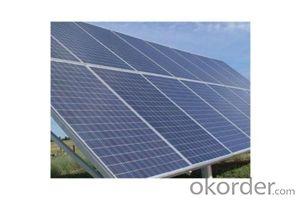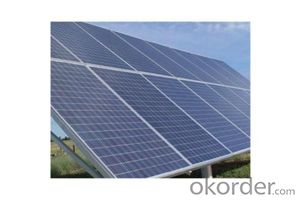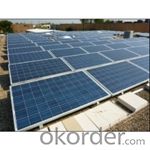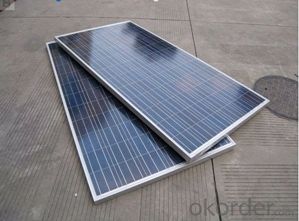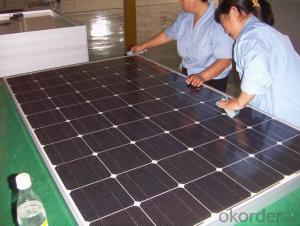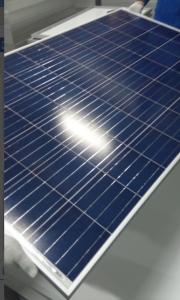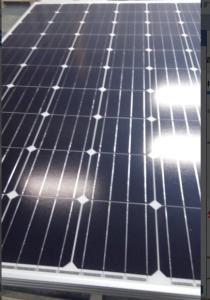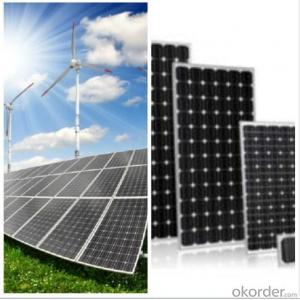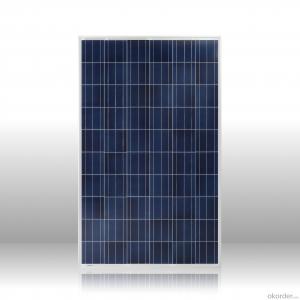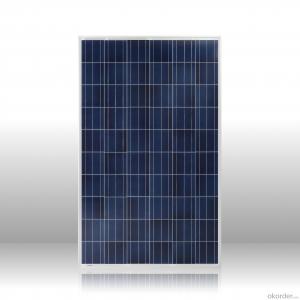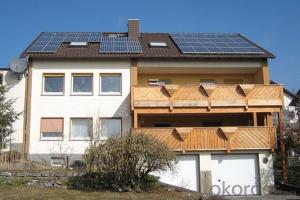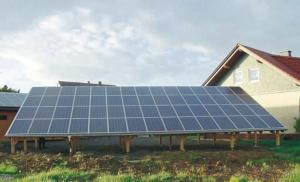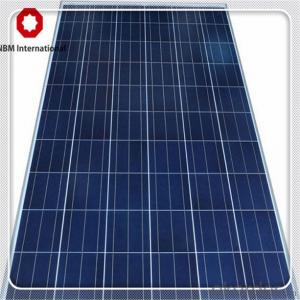Portland Solar Panels - Factory Direct Sale:A-Grade High Efficiency 250W Poly Solar Panels
- Loading Port:
- Shanghai
- Payment Terms:
- TT OR LC
- Min Order Qty:
- 5000 watt
- Supply Capability:
- 40000000 watt/month
OKorder Service Pledge
Quality Product, Order Online Tracking, Timely Delivery
OKorder Financial Service
Credit Rating, Credit Services, Credit Purchasing
You Might Also Like
Current
Our solar cells are widely used in solar pump, solar lighting, lamps, household electricity, traffic, communication, meteorological, building and photovoltaic power plants and so on.
Characteristics
Max Power Voltage Vmp(V): 30.4
Max Power Current Imp(A): 8.26
Open Circuit Voltage(V) : 37.5
Voc(V)Short Circuit (A): 8.88
Current Isc(A)Max Power Pm(W): 250
Temperature Coefficient of Cells
| NOCT | 45 |
| Temperature Coefficients of Isc(%/℃) | 0.04 |
| Temperature Coefficients of Voc(%/℃) | -0.34 |
| Temperature Coefficients of Pmp(%/C) | -0.42 |
Mechanical Data
| Dimension | 1638x982x35 |
| Weight | 18kg |
| No. of Cells and Connections | 60(6x10) |
| Tolerance | 0~+5W |
| Cell | Polycrystalline Cell |
| Packing | 812 Pcs/40ft(H) Container |
Limits
| Opening Temperature | -40℃ to +85℃ |
| Storage Temperature | -40℃ to +85℃ |
| Max System Voltage | 1000VDC(IEC)/ 600VDC(UL) |
Guarantees
| Products Guarantee | 12yrs free from defects in materials and workmanship |
| Performance Guarantee | No less than 90% within 10yrs and no less than 80% within 25yrs |
| Certificates | TUV(IEC61215&IEC61730), CE |
IV Curve

- Q: What is the difference between monocrystalline and polycrystalline solar panels?
- Monocrystalline solar panels are made from a single crystal structure, typically silicon, which results in a uniform appearance and higher efficiency. Polycrystalline solar panels, on the other hand, are made from multiple silicon fragments, resulting in a less uniform appearance and slightly lower efficiency.
- Q: Can solar panels be installed on schools or educational campuses?
- Yes, solar panels can be installed on schools or educational campuses. Installing solar panels on educational institutions not only helps to reduce their carbon footprint but also serves as a practical learning tool for students, showcasing the benefits of renewable energy. Additionally, solar panels can provide cost savings on electricity bills, allowing schools to allocate more resources towards education.
- Q: Are there any free classes to learn about solar energy and building a solar panel
- Why don't you just call a solar energy company and ask them anything you need to know, or check out websites- they usually have page with faqs or info. The company I used has lots of info on their website and they were very helpful.
- Q: Can solar panels be used for powering outdoor lighting?
- Yes, solar panels can be used to power outdoor lighting. Solar panels convert sunlight into electricity, which can be stored in batteries and used to power outdoor lights during nighttime. This allows for cost-effective and environmentally friendly outdoor lighting solutions.
- Q: When you add a load resistor to a PV panel (Solar panel) of 00 ohms what happens to the voltage produced from the cellAlso, as the resistance increases, how does this affect the output voltage
- Look at the graph data that looks like a rotated L. That is what voltage as a function of current characteristically behaves. The highest voltage value is called open circuit voltage (Voc). The current at lowest voltage value is called short circuit current (Isc). If you notice, a second curve is plotted that looks like a hill. That curve is power output as a function of voltage. At the peak of said hill, you get the most utility of your PV module, as you output the maximum power possible, and that is the nameplate value for the PV module's power rating.
- Q: I'm looking to see how much it would be to install solar panels on a home. Or more information on where i would be able to locate a place of purchase, or in general more information...
- A Solar panel usually cost between $0,000-20,000 and more. If you're not wanting to spend that much, I suggest you try the DIY solar panel guides. These are step-by-step guides in building solar panels. They are very cheap and overall, you can get solar panels for less than $200. The guide will help you choose where to buy and what to buy so you won't spend thousands of dollars. Whether you're a beginner or an expert, you can do it. If you're interested, just click on the link below. I also added some links where you can read reviews about these guides. Goodluck!
- Q: Can u guys help on how solar panels work and how it generates electricity?(or u can give me a good website that has solar panel info on it)~Thanks in advance!~
- Solar okorder under products that are sorted by watts per area. Also go to wikipedia to get more detailed information on solar cells.
- Q: Are you a Solar Panel Specialist/Genius/Enthusiast?
- Yes and No. I'm hardly a 'genius' or 'specialist' but I have built a couple solar panels on my own. They're actually pretty easy to construct and you can find all of the materials at your local hardware store. Each panel cost me about $60 to make. Solar technology is jumping by leaps and bounds, becoming more and more efficient :photo voltaic cells, for example. Solar energy is a viable energy source, that's for certain.
- Q: Can solar panels be installed on a hotel or hospitality facility?
- Yes, solar panels can certainly be installed on a hotel or hospitality facility. In fact, many hotels and hospitality facilities have already embraced solar energy as a sustainable and cost-effective solution to their energy needs. By installing solar panels, these establishments can reduce their reliance on traditional energy sources, lower their carbon footprint, and potentially save on energy costs in the long run. Additionally, solar panels can be integrated into the design of the building or installed on the rooftop, making them a viable option for hotels and hospitality facilities of any size.
- Q: I need a list of worldwide solar panel manufactures from china, US, Spain, Germany, Japan etc...Can any one direct ne to such place?I rather it will also contain comparison of parameters like efficiacy, quality etc and to be divedied by country of manufacturing.Thank you
- Actually Ofir, it is much easier and less expensive than you might believe. What you need is a magazine, like, Solar Today. There is only one that I am familiar with that gets into the nuts and bolts of solar panel manufacturers, installation, and other types of renewable energy. It's called, Home Power Magazine. We have a home that has been powered by the wind and sun for the last 0 years or so, and most of our initial information came from Home Power, and afterward, from many of the sources that they have in their articles. Every few issures, they take an item connected to renewable energy, such as an inverter, wind turbine, water turbine, or solar panel, and list all the different models that are available. They are broken down by manufacturer, and include specifications like power output, range of voltages, efficiency, materials, and even where they are manufactured. If you subscribe online for one year, the cost is around $25 USD, you will have access to all the previous issues that are archived on their website. You can use their search engine to locate an article listing all the solar panels, they did one a year or so ago with all the information you are looking for. Despite what you might be hearing, solar power usage is growing at an incredible rate. In the US alone, there are over 00,000 homes and businesses operating some level of solar power right now, that's good news. As far as different countries using different requirements, most all of the manufacturers today are selling their products to most countries worldwide, they are designed to meet requirements for almost anyplace you might use them. Check the magazine out today, you might learn more than you were originally looking for. I will include their link below, and some other good sources for information. You can google any one of them to find their website. Good luck, and take care...Rudydoo
Send your message to us
Portland Solar Panels - Factory Direct Sale:A-Grade High Efficiency 250W Poly Solar Panels
- Loading Port:
- Shanghai
- Payment Terms:
- TT OR LC
- Min Order Qty:
- 5000 watt
- Supply Capability:
- 40000000 watt/month
OKorder Service Pledge
Quality Product, Order Online Tracking, Timely Delivery
OKorder Financial Service
Credit Rating, Credit Services, Credit Purchasing
Similar products
Hot products
Hot Searches
